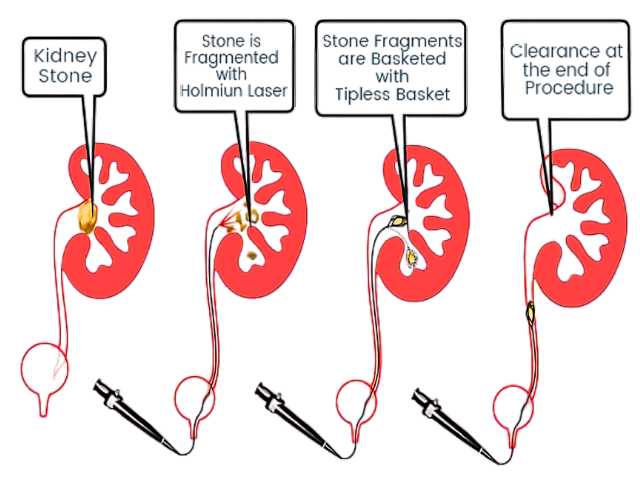Get relief from kidney stone pain with advanced Retrograde Intrarenal Surgery (RIRS) at KK Virat Hospital, Karimnagar. Our expert urologists specialize in minimal pain kidney stone laser treatment using the latest technology. Schedule a consultation with our top specialists today at Karimnagar’s top Urologists.
What is RIRS Surgery?
Retrograde Intrarenal Surgery (RIRS) is a state-of-the-art, minimally invasive procedure designed to remove kidney stones up to 14mm without any external cuts or incisions. This advanced technique utilizes a flexible ureteroscope and high-precision laser technology to locate, break, and extract stones from the kidneys (upper, middle, lower calyx), ureter, or urinary bladder with minimal risk and faster recovery.
RIRS ensures reduced pain, fewer complications, and a quicker return to daily activities compared to traditional surgical methods.

RIRS Surgery in Karimnagar
Retrograde Intrarenal Surgery (RIRS) is an advanced, minimally invasive procedure to remove kidney stones as large as 14mm. It effectively treats stones located in the kidney (upper calyx, middle calyx, and lower calyx), ureter, or urinary bladder without requiring cuts or incisions.
The procedure uses a ureteroscope and laser technology to ensure minimal complications. Contact KK Virat Hospital for expert consultation on RIRS in Karimnagar.
Who Can Benefit from RIRS Surgery?
RIRS is ideal for patients with recurring kidney stones or stones too large to pass naturally. It provides pain relief for stubborn stones that do not respond to medications like diuretics. RIRS is suitable for individuals with:
- Anatomically complex kidneys
- Large kidney stones (>12mm)
- Strictures in the kidneys
- Failure to remove stones by other treatment methods
- Bleeding disorders
Kidney Stone Passage Time
- Stone size < 2mm: 8 to 10 days
- Stone size 3 – 4mm: 12 to 20 days
- Stone size 4 – 6mm: 30 to 45 days
- Stone size > 6mm: 6 months to 1 year
Risk Factors for Kidney Stones
- Obesity
- Genetic predisposition
- Chronic dehydration
- High calcium supplement intake
- High animal protein consumption
Nephrolithiasis ICD-10 Codes
- Kidney & ureteral calculus: N20
- Pelviureteric junction (PUJ) obstruction: N20
- Vesicoureteric junction (VUJ) obstruction: N20.1
- Urinary tract calculus: N20.9
- Suburethral & ileal conduit obstruction: N21.8
- Hydronephrosis with renal calculous obstruction: N13.2
Diagnosis & Treatment
- Diagnostic Tests
- Before undergoing RIRS, the following diagnostic tests are conducted:
- Imaging tests (X-rays, abdominal ultrasound, MRI, or CT scan)
- Blood urea nitrogen (BUN) test
- Blood test
- Urinalysis
- Procedure
- Pre-Surgery Preparation: Patients are advised to avoid food and water 8-9 hours before the procedure and inform the doctor about medications and allergies.
- Anesthesia: The patient is given either spinal anesthesia (numbs the lower body) or general anesthesia (induces unconsciousness).
- Surgical Process: A flexible endoscope is inserted through the urethra to reach the kidney. The surgeon uses laser technology to break the stones into small fragments, which are removed using a stone basket.
- Stent Placement: A double J (DJ) stent is placed in the ureter to help flush out any remaining stone fragments. The stent is typically removed in 10-14 days.
Post-Surgery Recovery & Care
- Patients can resume light activities within 2-3 days.
- Full recovery is expected within one week.
- Recovery Tips:
- Drink plenty of water daily.
- Avoid spicy foods for at least two months.
- Reduce intake of high-animal protein foods.
- Engage in light physical activities but avoid strenuous exercise.
- If a stent is placed, avoid rigorous activities until its removal.
Benefits of RIRS Surgery
- No cuts or incisions
- Minimal blood loss
- Shorter hospital stays
- Faster recovery
- Negligible complications
- No damage to renal tissues
- Safe for both children and adults
- Resume work within a week
RIRS vs. PCNL
- RIRS is effective for stones up to 15mm in size and offers a high success rate with minimal complications.
- PCNL (Percutaneous Nephrolithotomy) is recommended for stones >20mm, offering a slightly higher success rate.
- The choice between RIRS and PCNL depends on factors like stone size, location, patient age, and medical history.
Why Choose RIRS Treatment at KK Virat Super Speciality Hospital?
KK Virat Super Speciality Hospital in Karimnagar is the top choice for RIRS treatment, offering expert care and state-of-the-art medical facilities. With 15+ years of experienced urologists, we ensure precise and effective kidney stone removal.
We provide insurance support, flexible payment options, and our follow-up consultations ensure a smooth recovery.
Book Your Appointment Today
Seeking the best RIRS treatment in Karimnagar? Get in touch with our leading urologists today:
- Call Us Directly: Get in touch with our medical coordinators to schedule an appointment with an expert urologist.
- Direct Visit: You can visit our hospital directly by carrying your previous medical records if you have a medical history. However, admission will be based on the doctor’s recommendation.
What is the full form of RIRS?
RIRS stands for Retrograde Intrarenal Surgery, a minimally invasive procedure used to remove kidney stones without external cuts or incisions.
What is the duration of RIRS?
The RIRS procedure typically takes 30 to 60 minutes, depending on the size and location of the kidney stones. However, the total hospital stay is usually less than 24 hours.
Is RIRS surgery painful?
No, RIRS is performed under spinal or general anesthesia, ensuring a pain-free experience during the procedure. Patients may experience mild discomfort or a burning sensation while urinating for a few days post-surgery.
What is the cost of RIRS surgery in Karimnagar?
The cost of RIRS surgery in Karimnagar varies based on factors such as stage of RIRS, hospital facilities, surgeon’s expertise, and insurance coverage.
Is there insurance coverage for the RIRS procedure in Karimnagar?
Yes, most health insurance providers cover RIRS surgery under kidney stone treatment. It is advisable to check with your insurance company and hospital for specific coverage details.
What are the complications of untreated kidney stones?
If left untreated, kidney stones can lead to:
- Blood in urine (hematuria)
- Severe pain and discomfort
- Urinary tract infections (UTIs)
- Blockage in the urinary tract
- Kidney damage or failure
Can kidney stones cause gastrointestinal problems?
Yes, kidney stones can cause nausea, vomiting, and bloating due to their impact on kidney function and urinary tract blockage, which can affect digestion.
What is the recovery time after RIRS surgery?
Most patients recover within 2-3 days and can resume normal activities. However, complete recovery, including the removal of stents (if placed), may take 10-14 days.
How can I prevent kidney stones from recurring?
To reduce the risk of kidney stones:
- Exercise regularly and avoid dehydration
- Drink plenty of water (2-3 liters daily)
- Limit salt and oxalate-rich foods
- Maintain a balanced diet with moderate protein intake
Why choose KK Virat Hospital for RIRS in Karimnagar?
KK Virat Hospital offers:
- State-of-the-art medical facilities for the best patient care
- Expert urologists with 15+ years of experience
- Advanced laser technology for precise stone removal
- Insurance assistance and flexible payment options
- Comprehensive post-surgery follow-ups


